Iranian Intelligence Says It Arrested Ten Citizens Spying For Foreign Power
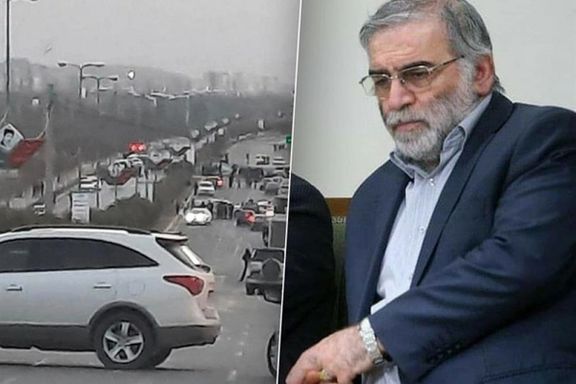
Iran’s intelligence ministry announced on Tuesday that ten people have been arrested for “links with intelligence services” of regional “adversaries”.

Iran’s intelligence ministry announced on Tuesday that ten people have been arrested for “links with intelligence services” of regional “adversaries”.
The ministry did not disclose which intelligence service had established the alleged network inside Iran. It also did not reveal the identity of the detainees, but said they were arrested to prevent the deepening of their ties with foreign spying agencies.
Iran periodically announces the discovery of “terrorist” or spying networks, but it rarely provides any concrete information or holds public trials. In some cases, individuals convicted of ties with Israel have been executed.
The use of the term ‘regional adversary’ could refer to Israel which is suspected of conducting spectacular sabotage acts against Iran’s nuclear, military and strategic economic targets since July 2020.
The intelligence ministry further said that the foreign spy agency “was collecting information on sensitive centers” and using Iranians who travel back and forth, to and from Iran, to enhance their presence.
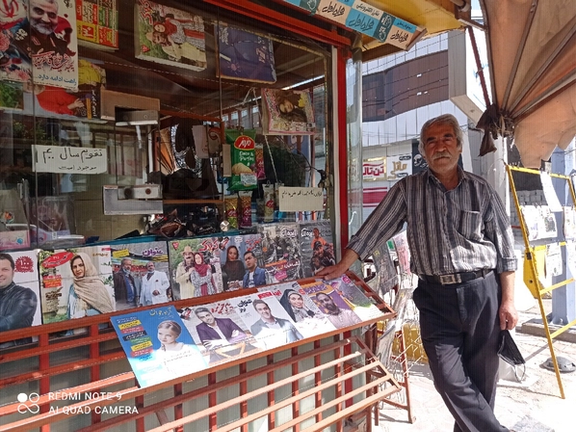
Iran's Culture Minister has confirmed that a restructuring of state media landscape is underway as a response to priorities put forward by the Supreme Leader.
The change in the Iranian media scene started with the appointment of Payman Jebelli as the head of the country's state television as the most significant media outlet directly under the supervision of Khamenei and his office. A long-time manager at state television, he has close links with Khamenei’s office and key hardliners.
Minister of Culture Mohammad Mehdi Esmaili made the remark while introducing Farshad Mehdipour, another hardline journalist and a relative of Supreme Leader Ali Khamenei's wife as his deputy minister for the press. Mehdipour was previously the editor of conservative e Sobh-e No newspaper that was Majles Speaker Mohammad Bagher Ghalibaf's mouthpiece when he was the mayor of Tehran. Esmaili introduced Mehdipour as a “theoretician” in news dissemination.
No one knows how much the government spends on state media, but in mid-2010s before the effective devaluation of Iran currency, the state television budget alone was close to one billion dollars, with more than 40,000 employees in 2020 compared with CNN’s 4,000. Thousands of people also work for hundreds of state newspapers and websites.
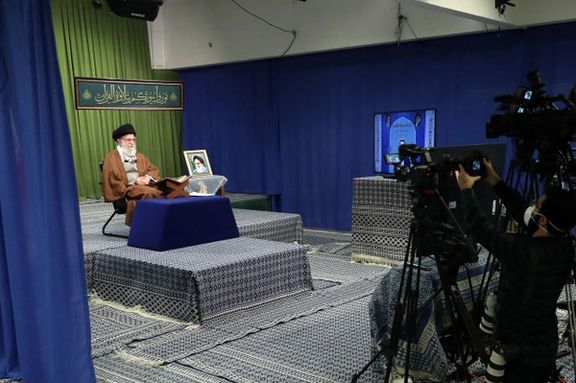
Another step in the restructuring of the media landscape is the belated appointment of the managing director and members of the high council of the official news agency IRNA, which stands for the Islamic Republic News Agency.
Esmaili appointed Ali Naderi, an ultraconservative journalist and the former editor of hardline Raja News, a pro-Ahmadinejad and pro-Paydari Party news outlet as the new managing director of IRNA. Naderi has said that IRNA is going to be "the news agency of the government and the political system [Nezam]”, which is also a nickname for Khamenei used by his devotees when they wish to distance him from his style of micromanagement.
IRNA has traditionally been under the control of presidential administrations, usually echoing the ideas and highlighting 'accomplishments' of the country's presidents. Its political slant changed with every presidential election. It was a proreform news outlet under President Mohammad Khatami, a hardline agency under Ahmadinejad and a moderate conservative news organization under President Hassan Rouhani.
With the appointment of the members of the High Council of Policymaking of IRNA, it appears that Tehran is serious about tightening its grip on the media, news dissemination and all sorts of cultural activities. The new council members are hardliners mainly supporting the ultraconservative Paydari Party, although Mehdipour is better characterized as a member of Qalibaf's self-proclaimed neo-con group.
Esmaili appointed another Paydari Party affiliate Mohammad Khazaei as deputy culture minister for cinema.
Meanwhile, the new deputy for cultural affairs who oversees books and other publications, Yasser Ahmadvand, and the acting deputy minister for artistic affairs Mahmoud Shaloui whose mandate is to make sure that musical and theatrical activities, as well as paintings and sculptures strictly comply with Shiite standards, are also well-known hardliner figures.
Even before introducing the new changes, dozens of news outlets in Iran belonged to either Khamenei's office (Kayhan, Khorasan and a fleet of social media platforms, etc.) or the revolutionary guards IRGC (Tasnim, Fars, Sepah News, Basij News, Basirat, Javan, Sobh-e Sadeq, etc). Others such as Mehr (Islamic Propagation Organization), Hemayat, Mizan News (the Judiciary) and scores of others were funded by various government offices.
The question now is that if the entire system is becoming part and parcel of the “regime”, or Khamenei’s office, and there is no room for factional politics, why the government needs over 50 TV channels and tens of news agencies, newspapers and news websites. Their only purpose appears to be for insider groups to receive hundreds of millions of dollars in funding from state coffers.
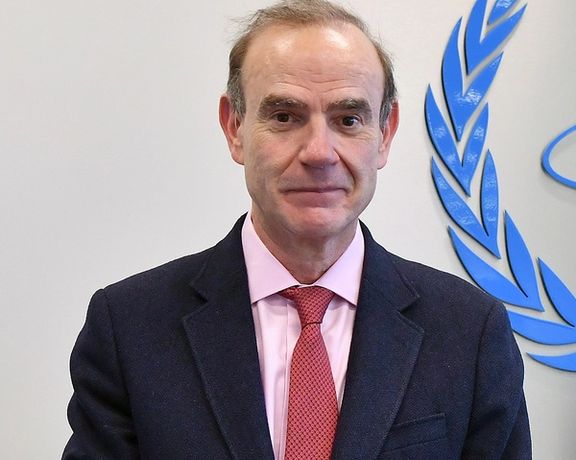
The EU envoy coordinating talks on reviving the Iran nuclear deal, Enrique Mora, will visit Tehran on Thursday, the Iranian foreign ministry has confirmed.
In June, Iran suspended talks with world powers to revive the 2015 nuclear deal and the West has been urging Tehran to return to talks immediately.
"(Mora's) trip will take place on Thursday. It follows consultations between the two sides on issues of mutual interest, including relations between Iran and the Union, Afghanistan and the nuclear accord," ministry spokesman Saeed Khatibzadeh told Iranian state media on Tuesday.
A major concern of Iran in any talks to rescue the 2015 nuclear deal would be around ways to verify the lifting of U.S. sanctions, Foreign Minister Hossein Amir-Abdollahian said on Saturday.
The talks, which aim to bring Washington and Tehran back into compliance with the pact, aimed at curbing the Iranian uranium enrichment program, were adjourned in June after hardline cleric Ebrahim Raisi (Raeesi) was elected Iran's president.
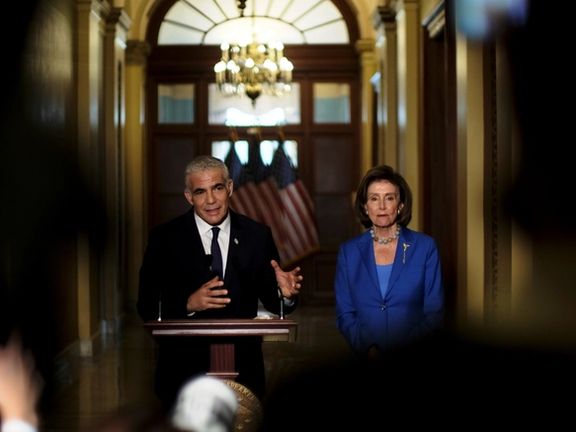
Israel’s Foreign Minister Yair Lapid met with US officials and members of Congress as part of a visit to Washington focused on Iran and its nuclear program.
Lapid’s office released a statement after his meeting with US National Security Advisor Jake Sullivan saying, “the foreign minister shared with the national security advisor Israel’s concerns about Iran’s race toward nuclear capabilities, as well as that Iran is becoming a nuclear threshold state.” The statement went on to stress that “Lapid also discussed with the national security advisor the need for an alternative plan to the nuclear agreement.”
In a separate readout, the spokesperson for the Biden administration’s National Security Council said “the officials also shared their perspectives on the threat posed by Iran. Mr. Sullivan reaffirmed President Biden’s commitment to ensuring that Iran never gets a nuclear weapon. The officials agreed that the United States and Israel will continue to consult closely on Iran and other critical matters impacting the security and stability of the region.”
Lapid also met with US Vice President Kamala Harris, Speaker of the House Nancy Pelosi, and other lawmakers. Harris noted Washington’s and Israel’s “shared concern” over Iran during her meeting with Lapid as well as the rights of Israelis and Palestinians to live in dignity. Lapid revealed that the focus of his visit was the Iranian nuclear program and the need for bipartisan support for Israel.
While in the United States, Lapid is also meeting with US Secretary of State Antony Blinken and will participate in a special trilateral meeting with Blinken and the UAE’s foreign minister, Sheikh Abdullah bin Zayed bin Sultan Al Nahyan on Wednesday.
The three parties will launch two new working groups, a senior State Department official said, as Washington hopes to expand the agreements between Israel and its neighbors known as the Abraham accords.
One working group will focus on religious coexistence and the other on water and energy issues, said the official, who briefed reporters ahead of the meeting on condition of anonymity, Reuters reported.
This visit comes as Israeli officials have become increasingly vocal in their impatience with the stalemate in nuclear negotiations with Iran. They have urged the Biden administration to prepare another package of sanctions as well as undertake military drills in the Middle East as a show of force to pressure Iran to return to the table. Jerusalem has also repeatedly emphasized the need to formulate a Plan B on Iran, should the nuclear negotiations with Tehran fail to salvage the nuclear deal from 2015.

Tuesday’s World Cup qualifier between Iran and South Korea in Tehran was played without fans, thwarting women after earlier notice that they would be admitted.
After the Iranian Football Federation announced Sunday there would be no spectators, a federation official, Hasan Kamranifar, said Monday the decision reflected difficulty in carrying out PCR tests or checking fans had been vaccinated.
The John Hopkins Covid-19 tracker puts the number of deaths from the virus in Iran in the past week at 1,521.
Faezeh Hashemi, daughter of former president Akbar Hashemi Rafsajani, told Ensaf News on Monday that Covid was an excuse. “This is a trick”, she said. “I hope Iranian girls don't give up, go to the stadium gates like they have always done not to lose what is their right.”
Hashemi said she hoped that Fifa, the world governing body for soccer, would not be deceived. In the past few years, Fifa has called on Iran to allow women into stadiums to watch men’s games. In October 2019, the ban on women was lifted for one game, between Iran and Cambodia at the 100,000-capacity Azadi stadium.
On Tuesday, the day of the game, an official of the cinema-owners’ association told the media that some cinemas would show the game live. "Will the PCR test be given to those who go to the cinemas?" the Iranian Students News Agency (ISNA) asked. "Is a football match with 7,000 spectators at Azadi Stadium more dangerous than watching it in closed spaces of cinemas?"
The issue of women watching men’s soccer, where female attendance was restricted after the 1979 Revolution, flared up in 2006, when principlist president Mahmoud Ahmadinejad backed down under pressure from senior Muslim clergy after deciding to let them in.
In recent years, women activists have organized campaigns to gain access to men’s games and some have gone to prison for their protests. In 2019 a 19-year-old fan of Esteghlal FC self-immolated in front of a Tehran court after being told she could face a six-month prison sentence for attempting to enter Azadi stadium disguised as a man. She died in hospital a week later of her injuries.
Hashemi, who from 1990 to 2011 headed the Women's Sports Federation, criticized the state broadcaster (IRIB) for not airing women's sports. "It's disrespect and violation of women's rights," she said, suggesting authorities had a "political and security-oriented view" of women's athletics. "I see no positive prospects for women's sports during [President Ebrahim] Raisi's [Raeesi] presidency," she opined.
The Covid pandemic led to football being played without spectators, but authorities had earlier suggested 7,000 fans could watch the Iran-Korea match provided that they had proof they had received two doses of the Covid vaccine. The game finished in a 1-1 draw, with Iran equalizing late with a header from Alireza Jahanabkhsh to stay top of the group.
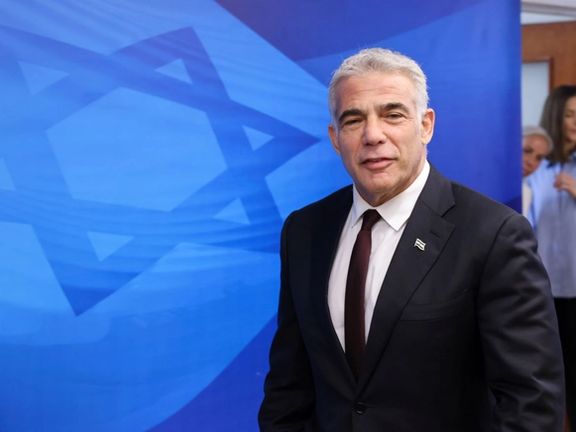
On Tuesday, Israel’s Foreign Minister Yair Lapid met with the US National Security Advisor and is set to meet with others as part of a visit to Washington.
Lapid’s office released a statement after his meeting with US National Security Advisor Jake Sullivan saying, “the foreign minister shared with the national security advisor Israel’s concerns about Iran’s race toward nuclear capabilities, as well as that Iran is becoming a nuclear threshold state.”
The statement went on to stress that “Lapid also discussed with the national security advisor the need for an alternative plan to the nuclear agreement.”
While in the United States, Lapid is also meeting with US Vice President Kamala Harris, US Secretary of State Antony Blinken, Speaker of the House Nancy Pelosi, and other lawmakers. He will also participate in a special trilateral meeting with Blinken and the UAE’s foreign minister.
This visit comes as Israeli officials have become increasingly vocal in their impatience with the stalemate in nuclear negotiations with Iran. They have urged the Biden administration to prepare another package of sanctions as well as undertake military drills in the Middle East as a show of force to pressure Iran to return to the table.
Jerusalem has also repeatedly emphasized the need to formulate a Plan B on Iran, should the nuclear negotiations with Tehran fail to salvage the nuclear deal from 2015.